#Princess Xijun
Explore tagged Tumblr posts
Text
[Hanfu · 漢服]The relationship between women in history is not just love rivals,
“but also thousands of years later, everyone knows that it is me and you.”
Let's get to know about them/她们 in China history.
1.【Han Dynasty】:Princess Jieyou (解忧公主) & Feng Liao (馮嫽)
Princess Jieyou (Chinese: 解忧公主; 121 BC – 49 BC), born Liu Jieyou (Chinese: 刘解忧), was a Chinese princess sent to marry the leader of the Wusun kingdom as part of the Western Han Chinese policy of heqin(和亲).
As the granddaughter of the disgraced Prince Liu Wu (劉戊) who had taken part in the disastrous Rebellion of the Seven States,her status was low enough that she was sent to replace Princess Liu Xijun (劉細君) after her untimely death and marry the Wusun king Cunzhou (岑陬).
Jieyou lived among the Wusun for fifty years and did much work to foster relations between the surrounding kingdoms and the Han. She was particularly reliant upon her attendant, Feng Liao, whom she dispatched as an emissary to Wusun kingdoms and even to the Han Court. She faced opposition from pro-Xiongnu members of the Wusun royalty, particularly Wengguimi’s Xiongnu wife. When word came that the Xiongnu planned to attack Wusun, she convinced her husband to send for aid from the Han Emperor. Emperor Wu of Han sent 150,000 cavalrymen to support the Wusun forces and drive back the Xiongnu.
In 51 BCE at the age of 70, Jieyou asked to be allowed to retire and return to the Han. Emperor Xuan of Han agreed and had her escorted back to Chang'an where she was welcomed with honor. She was given a grand palace with servants usually reserved for princesses of the imperial family. In 49 BCE, Jieyou died peacefully.
Feng Liao (馮嫽)
Feng Liao (馮嫽) was China's first official female diplomat,[citation needed] who represented the Han dynasty to Wusun (烏孫), which was in the Western Regions. It was a practice for the Imperial Court to foster alliances with the northern tribes via marriage, and two Han princesses had married Wusun kings.
Feng Liao was the maidservant of Princess Jieyou (解憂公主), who was married off to a Wusun king. Feng herself later married an influential Wusun general, whose good standing with Prince Wujiutu (烏就屠) of the kingdom later proved beneficial to the Han dynasty.
When Prince Wujiutu seized the throne of Wusun in 64 BC, after his father died, there was fear in the Imperial Court of Han that Wujiutu, whose mother was Xiongnu, would allow Wusun to become Xiongnu's vassal.
Zheng Ji, Governor of the Western Regions, recalled that Feng Liao had married into Wusun and with her familiarity of the Wusun customs, she was a prime candidate to persuade Wujiutu to ally his kingdom with Han. Wujiutu acceded and Emperor Xuan of Han (漢宣帝) sent for Feng. He praised her for her judgement and diplomacy, and appointed her as the official envoy to Wusun.
Wujiutu was conferred the title "Little King of Wusun" while his brother, the son by a Han princess, was named "Great King of Wusun". Wusun was divided between the two kings and tensions in that region were eased.
※Xiongnu: Xiongnu: A nomadic tribe that has occupied northern China for a long time. Later it gradually became a state. It harassed the borders of the Han Dynasty for a long time and robbed supplies.
------
With their efforts, the Wusun Kingdom gradually tended to support the Han Dynasty, and the Xiongnu's defeat in China also began.
------
2.【Tang Dynasty】:Shangguan Wan'er(上官婉儿)&Princess Taiping (太平公主)
Shangguan Wan'er/上官婉儿 (664 – 21 July 710) was a Chinese politician, poet, and imperial consort of the Wu Zhou and Tang dynasties. Described as a "female prime minister,"Shangguan rose from modest origins as a palace servant to become secretary and leading advisor to Empress Wu Zetian of Zhou. Under Empress Wu, Shangguan exercised responsibility for drafting imperial edicts and earned approbation for her writing style. She retained her influence as consort to Wu's son and successor, Emperor Zhongzong of Tang, holding the imperial consort rank of Zhaorong (昭容). Shangguan was also highly esteemed for her talent as a poet.Shangguan was also highly esteemed for her talent as a poet. In 710, after Emperor Zhongzong's death, Shangguan was killed during a palace coup that ended the regency of Empress Dowager Wei.
Princess Taiping (太平公主)lit. "Princess of Great Peace", personal name unknown, possibly Li Lingyue (李令月) (after 662 – 2 August 713) was a royal princess and prominent political figure of the Tang dynasty and her mother Wu Zetian's Zhou dynasty. She was the youngest daughter of Wu Zetian and Emperor Gaozong and was influential during the reigns of her mother and her elder brothers Emperor Zhongzong and Emperor Ruizong (both of whom reigned twice), particularly during Emperor Ruizong's second reign, when for three years until her death, she was the real power behind the throne.
She is the most famous and influential princess of the Tang dynasty and possibly in the whole history of China thanks to her power, ability and ambition. She was involved in political difficulties and developments during the reigns of her mother and brothers. Indeed, after the coup against Empress Dowager Wei, she became the real ruler of Tang. During the reign of Emperor Ruizong, she was not restricted by anything, the emperor issued rulings based on her views and the courtiers and the military flattered her and majority from every civil and military class joined her faction, so her power exceeded that of the emperor.
Eventually, however, a rivalry developed between her and her nephew, Emperor Ruizong's son, Crown Prince Li Longji. Both of them were hostile in power-sharing and they fought for the monopoly over power. After Emperor Ruizong yielded the throne to Li Longji (as Emperor Xuanzong) in 712, the conflict came to the political forefront, and openly, the court became a manifestation of conspiracy rather than the administration of the empire; in 713, Emperor Xuanzong, according to historical records, believing that she was planning to overthrow him, acted first, executing a large number of her powerful allies and forcing her to commit suicide.
------
The relationship between Shangguan Wan'er and Princess Taiping has always been written as "enemies" in official history, but with the phrase "千年万岁,椒花颂声", their friendship that has been buried for thousands of years was revealed.
The"千年万岁,椒花颂声" sentence comes from the epitaph written by Princess Taiping for Shangguan Wan'er. The original text is: "潇湘水断,宛委山倾,珠沉圆折,玉碎连城。甫瞻松槚,静听坟茔,千年万岁,椒花颂声”
Translation: Now that you are far away, the sky and the earth will lose their color. I'm afraid that all I can do in the future is to sit and look at the tea tree in front of your tomb. Maybe I can hear your voice again when I stand within an inch of the tomb. But this is a delusion after all, a quiet tomb, no beautiful face, a empty place of death. I hope that in a thousand or ten thousand years, there will still be people like me who remember you.
------
3.【Late Qing Dynasty】:Lü Bicheng(呂碧城) & Qiu Jin (秋瑾)
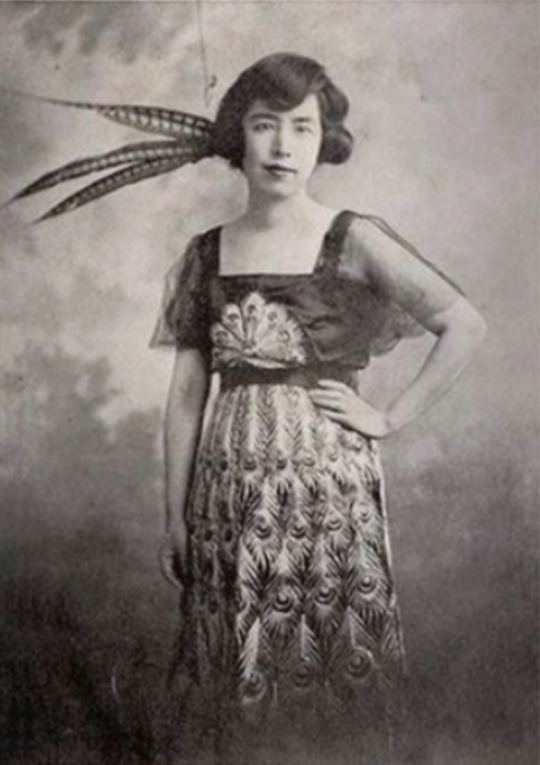
Lü Bicheng(呂碧城)also known as Alice Pichen Lee(1883–1943) was a Chinese writer, activist, newspaper editor, poet and school founder. She has been mentioned as one of the top four women in literature from the early Republic of China.
When she was four, her father retired to Lu'an, Anhui. She lived a life of comfort until the age of 12, when her father died in 1895. Because Lü Fengqi had no male heir, relatives of the Lü lineage contested for his inheritance, and Yan Shiyu and her four daughters were forced to move to Lai'an County to live with her natal family. When she was nine, Lü Bicheng was betrothed to a Wang family, but as her own family fortune declined, the Wang family broke off the marriage contract, giving the young Bicheng the stigma of a "rejected woman". The resulting emotional scar is often considered a major factor in her later decision to never marry.[8] Her widowed mother and the Lü girls were not well treated at the Yan family in rural Anhui. When Lü was 15 or 16, Yan Shiyu sent her to live with her maternal uncle Yan Langxuan (嚴朗軒), who was the salt administrator in Tanggu, the port city outside the northern metropolis of Tianjin. Her sister Huiru also joined her later.
During her stay in Tanggu, Qing China went through the tumultuous period of the failed Hundred Days' Reform of 1898, which brought about increasing awareness of women's education, and the Boxer Rebellion of 1900. In 1904, Mrs. Fang, the wife of her uncle's secretary, invited Lü Bicheng to visit a girls' school in Tianjin, but her uncle prevented her from going and severely reprimanded her. The next day, she ran away from her uncle's home, and took the train to Tianjin with no money or luggage. She wrote a letter to Mrs. Fang, who was staying at the dormitory of the Ta Kung Pao newspaper. Ying Lianzhi, the Catholic Manchu nobleman who founded the newspaper, read the letter and was so impressed by it that he made her an assistant editor. Lü Bicheng wrote a "progressive" ci that she had previously written, set to "A River Full of Red" ("Manjianghong") usually used to express heroic emotions. Ying transcribed the whole song in her diary and published it in L'impartial two days later. At the time, it was sensational for a woman to write for an influential national newspaper such as Ta Kung Pao. She was 21 years old. She used Ta Kung Pao to promote feminism and became a well-known figure.
Lü's ci poetry was published in the newspaper and it was very well received. She was the chief editor of the newspaper from 1904 to 1908. In 1904 she decided to improve education for girls. She had published her thoughts on women's rights and the general editor of the newspaper introduced her to Yan Fu who was an advocate for Western ideas. The Beiyang Women's Normal School was established that same year. At 23 Lü took on the job of principal of the school she had founded two years before. At first this school found it difficult to find girls who qualified for secondary education and students were brought in from Shanghai to make up the numbers.
Lü knew the revolutionary Qiu Jin and they had similar objectives but Lü did not join her in Japan when she was invited as she was unsure whether women should meddle in politics. She was then chosen to be secretary to Yuan Shikai, one of the most powerful people in China. When he set out to declare himself emperor of China she left, like many of his followers, and abandoned him.
--

Qiu Jin (秋瑾)8 November 1875 – 15 July 1907,was a Chinese revolutionary, feminist, and writer.Her sobriquet name is Jianhu Nüxia (Chinese: 鑑湖女俠 lit. 'Woman Knight of Mirror Lake').
Qiu was born into a wealthy family. Her grandfather worked in the Xiamen city government and was responsible for the city's defense. Zhejiang province was famous for female education, and Qiu Jin had support from her family when she was young to pursue her educational interests. Her father, Qiu Shounan, was a government official and her mother came from a distinguished literati-official family. Qiu Jin's wealthy and educated background, along with her early exposure to political ideologies were key factors in her transformation to becoming a female pioneer for the woman's liberation movement and the republican revolution in China.
In the early 1900s, Japan had started to experience western influences earlier than China. As to not fall behind, the Qing government sent many elites to learn from the Japanese. Qiu Jin was one of these elites that got the chance to study overseas. After studying in a women's school in Japan, Qiu returned to China to participate in a variety of revolutionary activities; and through her involvement with these activities, it became clear how Qiu wanted others to perceive her. Qiu called herself 'Female Knight-Errant of Jian Lake' — the role of the knight-errant, established in the Han dynasty, was a prototypically male figure known for swordsmanship, bravery, faithfulness, and self-sacrifice — and 'Vying for Heroism'
Qiu Jin had her feet bound and began writing poetry at an early age. With the support from her family, Qiu Jin also learned how to ride a horse, use a sword, and drink wine—activities that usually only men were permitted to learn at the time.In 1896 Qiu Jin got married. At the time she was only 21, which was considered late for a woman of that time. Qiu Jin's father arranged her marriage to Wang Tingchun, the youngest son of a wealthy merchant in Hunan province. Qiu Jin did not get along well with her husband, as her husband only cared about enjoying himself.While in an unhappy marriage, Qiu came into contact with new ideas. The failure of her marriage affected her decisions later on, including choosing to study in Japan.
While still in Tokyo, Qiu single-handedly edited a journal, Vernacular Journal (Baihua Bao). A number of issues were published using vernacular Chinese as a medium of revolutionary propaganda. In one issue, Qiu wrote A Respectful Proclamation to China's 200 Million Women Comrades, a manifesto within which she lamented the problems caused by bound feet and oppressive marriages. Having suffered from both ordeals herself, Qiu explained her experience in the manifesto and received an overwhelmingly sympathetic response from her readers. Also outlined in the manifesto was Qiu's belief that a better future for women lay under a Western-type government instead of the Qing government that was in power at the time. She joined forces with her cousin Xu Xilin and together they worked to unite many secret revolutionary societies to work together for the overthrow of the Qing dynasty.
Between 1905 and 1907, Qiu Jin was also writing a novel called Stones of the Jingwei Bird in traditional ballad form, a type of literature often composed by women for women audiences. The novel describes the relationship between five wealthy women who decide to flee their families and the arranged marriages awaiting them in order to study and join revolutionary activities in Tokyo. Titles for the later uncompleted chapters suggest that the women will go on to talk about “education, manufacturing, military activities, speechmaking, and direct political action, eventually overthrowing the Qing dynasty and establishing a republic” — all of which were subject matters that Qiu either participated in or advocated for.
Life after returning to China
Qiu Jin was known as an eloquent orator who spoke out for women's rights, such as the freedom to marry, freedom of education, and abolishment of the practice of foot binding. In 1906 she founded China Women's News (Zhongguo nü bao), a radical women's journal with another female poet, Xu Zihua in Shanghai. They published only two issues before it was closed by the authorities. In 1907, she became head of the Datong school in Shaoxing, ostensibly a school for sport teachers, but really intended for the military training of revolutionaries[citation needed]. While teaching in Datong school, she kept secret connection with local underground organization—The Restoration Society. This organization aimed to overthrow the Manchu government and restore Chinese rule.
Death
In 1907, Xu Xilin, Qiu’s friend and the Datong school’s co-founder was executed for attempting to assassinate his Manchu superior. In the same year, the authorities arrested Qiu at the school for girls where she was the principal. She was tortured but refused to admit her involvement in the plot. Instead the authorities used her own writings as incrimination against her and, a few days later, she was publicly beheaded in her home village, Shanyin, at the age of 31. Her last written words, her death poem, uses the literal meaning of her name, Autumn Gem, to lament of the failed revolution that she would never see take place:
秋風秋雨愁煞人 (Autumn wind, autumn rain — they make one die of sorrow)
After Qiu Jin was killed, no one dared to collect her body. Lu Bicheng endured her grief and took great risks to bury her friend. The guarding Qing army learned that the woman who came to collect the corpse was Lu Bicheng, who was famous in China, and they had no choice but to do anything.
Qiu Jin's death caused Lu Bicheng to lose a rare confidant in life. She wrote many poems in memory of Qiu Jin, recalling this like-minded friend.
Later, Lü Bicheng wrote "The Biography of the Revolutionary Heroine Qiu Jin" in English, which was published in newspapers in New York, Chicago and other places in the United States. It caused a great response and not only made many people in the world know about Qiu Jin's legendary story, but also published it in newspapers in New York and Chicago. It also makes people understand the darkness and corrupt social status quo of the Qing Dynasty. Lu Bicheng used a pen of her own to record her friendship with Qiu Jin, and also fulfilled her promise to Qiu Jin to respond with the "battle of words"
————————
📸Video & 🧚🏻 Model:@荷里寒 & @阿时Ashi_
🔗Weibo:https://weibo.com/3618951560/NEZZnpQRq
————————
#chinese hanfu#china history#woman power#woman in history#hanfu#hanfu accessories#hanfu_challenge#chinese traditional clothing#china#chinese#han dynasty#tang dynasty#late qing dynasty#feminism#revolution#漢服#汉服#中華風#girl power#hanfu girl
383 notes
·
View notes
Text

From the Kayla X "Legendary Spirits" blind box figure collection:
Her name is Withered.


I haven't mentioned it so far for the others, because the names are the same, but each of these girls have their name written in Chinese as well as English on the box they came in. Withered is the first to have it translate to something other than her English name.


I'm going off Google Translate here, but that translates her name as 'lotus heart', so it's something to note.
This girl...was so hard to find. I, in fact, didn't find anything good, and the closest thing I've got I'm certain isn't the legend she's actually referencing. For one, the person in the myth is a man, and all the others so far have been female as the figurines are. Secondly, nothing to do with lotus flowers, which are referenced in her name and are what she is standing on. I'll walk through my research as I did it and leave it where I'm at now, and hopefully I can find out who she really is at some point and come back to update this post.
So. Standing on a lotus flower is a pretty common way to portray Buddhas or various gods/goddesses, as lotuses in general represent freedom from corruption and worldly influence. Lotus flowers float on top of the water without sinking into it, and all that. Withered also has skeleton arms rising up from the lotus leaves to clutch/reach for her. Two red tear tracks run down her cheeks.
I believe the skeleton lute is in fact either a pipa or a biwa, which are, respectively, Chinese and Japanese versions of a wooden lute. It's hard to tell much more specifically with the stylization of the figure.
Basically, fruitlessly searching through myths including lotuses, death, the pipa, and then the biwa led me from the lotus-eaters (Greek myth, not relevant) to the Lotus Flower and the Dragon King (a woman is turned into a lotus), to the goddess Benzaiten (goddess of music, the arts, and a bunch of other things), to the biwa hoshi and Tale of Heike (a prose epic about the end of the Genpei War), to Liu Xijun (Han princess married off to a foreign king to secure an alliance), to Wang Zhaojun (a concubine married off to the Huns who played sad music on her pipa), to the Pipa xing (a poem about a disgraced pipa player meeting an exiled official), then back to the biwa hoshi. And finally, where I stopped, with Hoichi the Earless.
Biwa hoshi were men, typically blind, who traveled around performing on the pipa. They weren't technically priests, but they dressed like them and they're also called 'lute priests'. Wikipedia refers to them as lay-priests. (I unfortunately used Wikipedia for a lot of my connections here, but rest assured it is not the only place I was searching)
'Hoichi the Earless' is the story of a (again, blind) biwa hoshi staying with a local priest, who is woken in the night by a samurai who brings him to play for his lord. This continues each night until Hoichi's priest friend finds him one night playing his music in a graveyard. He paints Hoichi's body with the Heart Sutra to make him invisible to spirits, but neglects to paint his ears. That night the ghostly samurai returns, and is only able to see Hoichi's ears, so he rips them off for ignoring him and returns to his ghost lord. Hoichi survives.
It's not what Withered is depicting, but it's as close as I could find with no clear starting point. The other figures I've investigated so far all had some sort of smoking gun to point me in the right direction. With Bleeding it was the rakshasa birds, with Forgotten it was the meng po soup, with Mirage it was her tears and the pearl. Withered has a lot of cool elements, but her descriptions are vague and don't give me enough to go off of. Still, it was a lot of fun trying, and learning a lot of new things.
The Hoichi the Earless story was popularized and brought to the English-speaking world by a 1904 book called Kwaidan: Stories and Studies of Strange Things, which Wikipedia hilariously describes as "several Japanese ghost stories and a brief non-fiction study on insects." Unlike the book from Bleeding's research, it is still in print and is available on Amazon for $12. I know what I'm reading soon!
If you know more about East Asian myths than me (very likely) and have an idea of who Withered is meant to be, please please reach out and let me know! She's one of my favorites of the collection, and I'm quite disappointed I couldn't find her on my own.
Sources:
#kayla x legendary spirits#blind box figures#kikagoods#doll collecting#my collection#mythology and folklore
0 notes
Text
You know why I’m really enjoying Strange Tales of Tang Dynasty? Because not only are the cases really interesting, all the characters are good. Su Wuming and Lu Lingfeng give me that Jiang Yuelou and Bai Jinbo, Jiang Yuelou and Chen Yuzhi energy that I crave, Xue Huan gives me Chu Min energy, Pei Xijun (who I didn’t originally like because I’m wary of all female characters at first if there are two male leads) gives me Chu Ran energy and DO YOU KNOW HOW MANY FEMALE CHARACTERS GIVE ME THAT ENERGY?! HARDLY ANY! Also Chicken Fei, he’s like hit or miss with the energy but he is enjoyable and he does make me laugh, so I’m not mad about it. Also, Lu Lingfeng’s subordinates, absolute Song Rong and Sun Yongren energy. I love it. I love this drama. It’s so good. I hope it doesn’t let me down and I hope we do something about the prince and princess at the end because if Lu Lingfeng doesn’t fucking bitchslap/punch the fuck out of the prince, I’ll fucking do it myself
7 notes
·
View notes
Video
tumblr
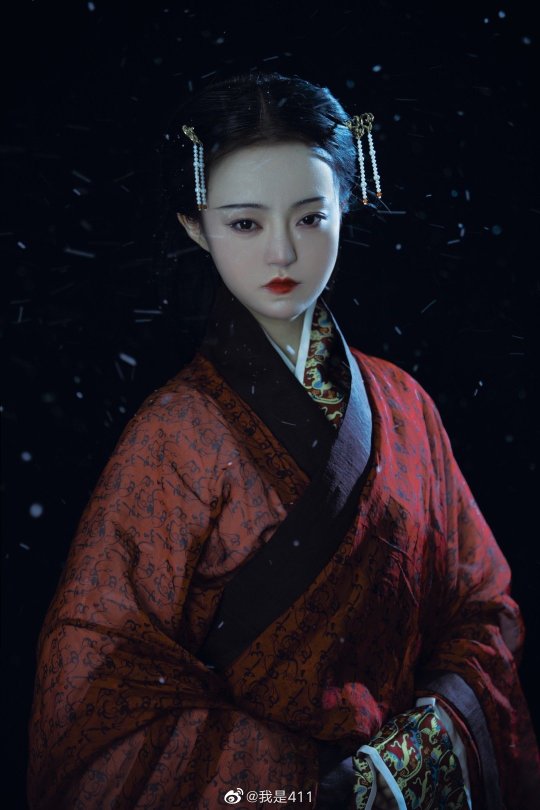
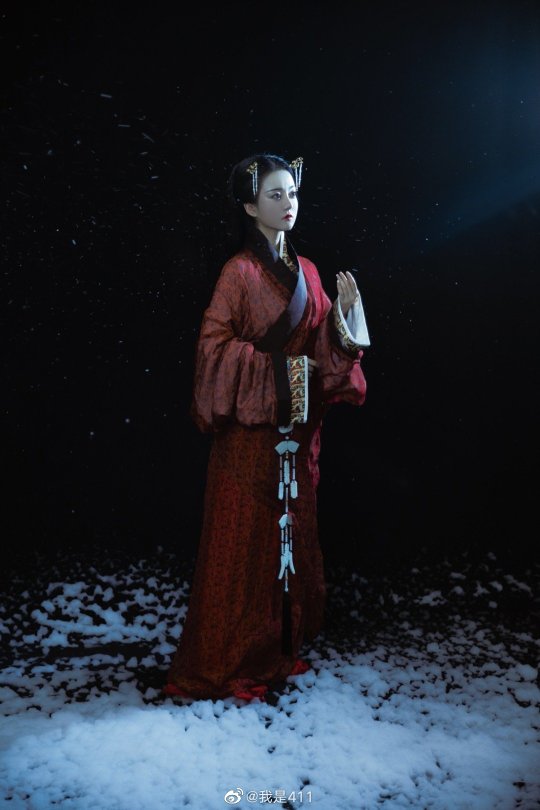


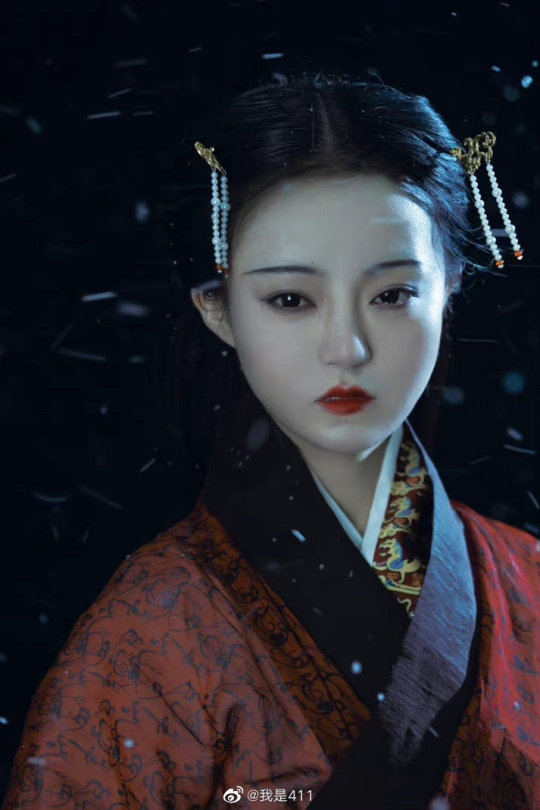
【Artifact Reference】
China Western Han Dynasty Painted Female Figurines (early and middle period of Western Han)
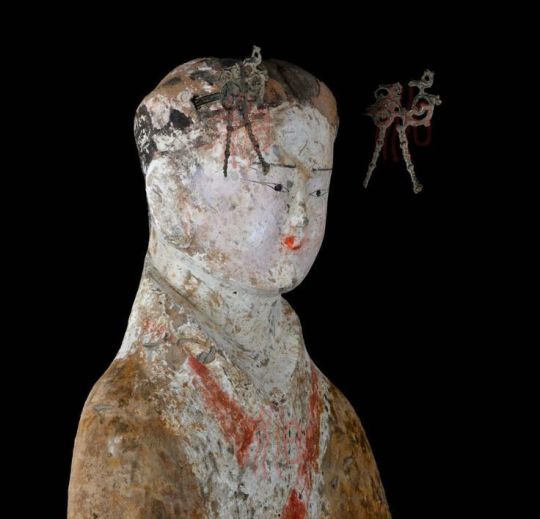
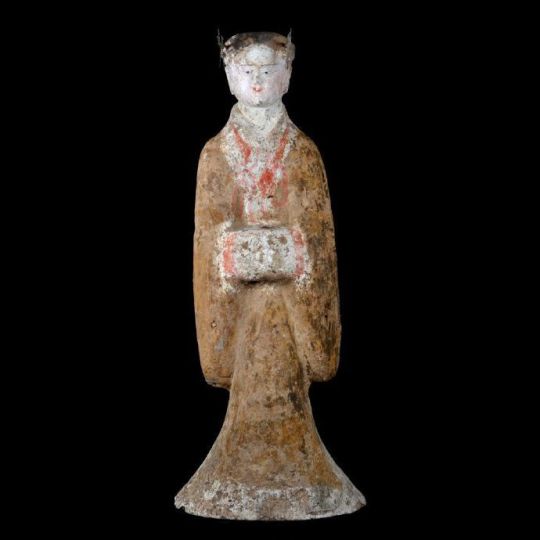
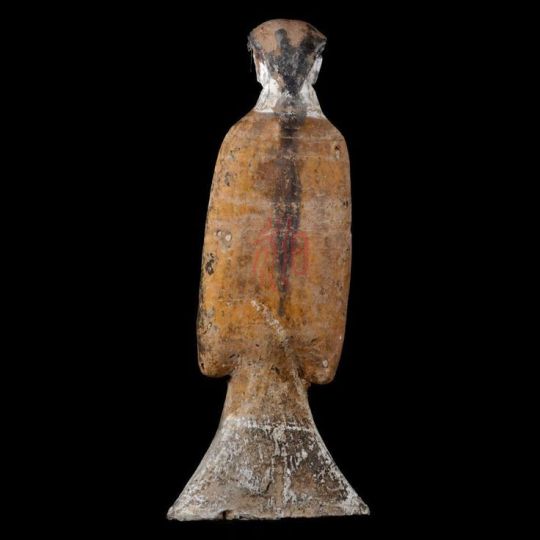
China National Museum Western Han Dynasty Woman Restoration Wax Sculpture

[Hanfu · 漢服]China Western Han Dynasty Chinese Traditional Clothing Hanfu :【Liu Xijun's Clothing Story|The first Heqin Princess (marriage alliance) who name was recorded at history actually are the daughter of a Criminal Prince?】
Cooperate with 【 @MYONS弥玥泉 Miyuequan hydrating spray 】
————–
【History About Princess Xijun of Han Dynasty 】
Liu Xijun (Chinese: 劉細君;123?–101 BC), also known as Princess Xijun (細君公主), Princess of Jiangdu (Chinese: 江都公主) or the Princess of Wusun (Chinese: 烏孫公主), was a princess of the Han dynasty sent to marry the King of Wusun(烏孫) as marriage alliance. A poem said to be by her is one of the earliest known Chinese poems attributable to a named woman.
Liu Xijun was the daughter of the King of Jiangdu (in modern-day Yangzhou, Jiangsu), Liu Jian (劉建) and granddaughter of Liu Fei, brother of Emperor Wu of Han. Xijun was orphaned while still an infant. Her father was described as incestuous, cruel and depraved, and had to commit suicide after being implicated in a rebellion. Her mother was also executed the same year for “practicing witchcraft”. As daughter of disgraced parents, she would likely have a low status at the Han court.
In 105 BC, Xijun's status was elevated and she was made a princess by Emperor Wu(漢武帝). The emperor wanted to send her off to marry the king (Kunmi or Kunmo) of the Wusun, Liejiaomi (猎驕靡), with the intention of forming an alliance with the Wusun and breaking up the confederacy of the Xiongnu. After a gift of 1,000 horses from the Wusun were sent to the Han court, she was sent to the Wusun 5,000 miles away in the Ili valley area with a retinue of 100 officials, eunuchs, servants and carriages. After her marriage, she was made Lady of the Right, a position subordinate to the Lady of the Left who was of Xiongnu origin.
However, her husband was elderly, she rarely saw him and could not communicate with him. Two years after she married to Wusun King, The Wusun King died. Most of the ancient nomadic had the custom of "Shouji Marriage/ Widow inheritance(收继婚)"which mean a custom that compulsory marriage of a widow to a brother of her deceased husband etc. In the case of the royal family, it is necessary to marry the next King. Xijun is the King's Lady, after the king's death, she needs to marry the next king according to the custom, and the next king was her husband grandson Cenzou (岑陬).
Although Xijun protested such remarriage which was considered improper in Han Chinese custom and beg to Emperor Wu (漢武帝) to let her return to Han, the Emperor Wu (漢武帝) replied that she should comply as the alliance with Wusun was deemed necessary to vanquish the Xiongnu (匈奴). She duly married Cenzou, who became king after Liejiaomi died. She had a daughter with him in 102 BC, and died the following year.She died at the age of 21, and never returned to her country in her life. A further princess named Princess Jieyou was sent to marry Cenzou (岑陬) after her death.
-----------
A poem credited to Xijun is given in Hanshu:
【悲愁歌/ Song of Sorrow 】
悲愁歌吾家嫁我兮天一方,
My family married me off to the edge of the world
遠托異國兮烏孫王。
Far away in the strange land of the Wusun king
穹廬為室兮旃為牆,
A domed hut is my chamber, the felt my walls
以肉為食兮酪為漿。
Meat is my food, fermented milk my drink
居常土思兮心內傷,
Living here, I long for my land, and my heart aches
願為黃鵠兮歸故鄉。
Wishing I could be a yellow swan,and return to my old home
-----------
In the history that has lasted for hundreds of years, the marriage of princesses to foreign country/tribe has become a common diplomatic method. Countless women who shoulder the heavy trust of the empire and share the name of "Princess" go to foreign countries alone to complete the mission of unknown answer.Their fate is forced to conform to the torrent of the times, it is a sigh.
_______
🧚🏻Model&📸 Video : @我是411
👗Hanfu : @春谷山房 @丹青荟传统服饰
🔗Weibo:https://weibo.com/2040114485/M87FzECWs
_______
#chinese hanfu#Western Han Dynasty#Han Dynasty#Princess Xijun#chinese history#hanfu#chinese#chinese traditional clothing#chinese coustume#hanfu accessories#hanfu art#Chinese Culture#Wusun#zhiju#Shouji Marriage/ Widow inheritance(收继婚)#Emperor Wu(漢武帝)#marriage alliance princess#China History
102 notes
·
View notes